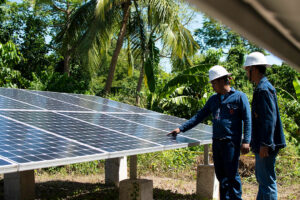The Department of Energy (DoE) said it is open to receiving unsolicited proposals from microgrid developers, pending the launch of the third round of auctions for microgrid system providers (MGSPs).
“The timeline (for the third round) could be early next year. But we can accept unsolicited proposals from proponents,” Energy Undersecretary Rowena Cristina L. Guevara told BusinessWorld.
Ms. Guevara said that the new feature for this round is the availability of data on potential microgrid locations that will be offered in the auction.
“The data will help the potential bidders in deciding which lots to bid for,” she said.
Under the Republic Act (RA) No. 11646, or the Microgrid Systems Act of 2022, the DoE must conduct a competitive selection process for potential concessionaires seeking to serve off-grid areas.
The first MGSP auction was conducted in 2023, in which only one out of nine prequalified bidders submitted a complete bid proposal. Among the reason cited for the dearth of bids was the lack of time for potential proponents to prepare project proposals.
In the second round, only one proponent expressed interest and was later deemed prequalified. However, the auction failed due to the prequalified bidder’s inability to submit a complete bid proposal by the deadline.
In May, the DoE announced that the third round will consist of 71 lots covering 167 unserved and underserved areas.
The DoE said it has improved the policy and regulatory aspects of microgrid service operations “to create a more transparent, efficient, and investor-friendly environment for interested private investors.”
The DoE revised the implementing rules and regulations of RA 11646, designating microgrid projects as automatically qualified for classification as an “energy project of national significance.” This certification fast-tracks the issuance of the necessary permits and licenses.
The notice of award to the MGSP will also include a renewable energy service contract, subject to the completion of remaining requirements, particularly the submission of proof of possessory rights over the service area.
“Through these efforts, we aim to empower our most remote communities with clean, reliable, and affordable energy, because energy access is not just a policy objective — it is a fundamental right,” Ms. Guevara said. — Sheldeen Joy Talavera

